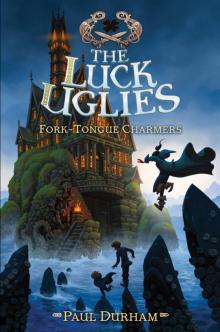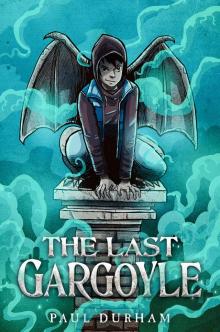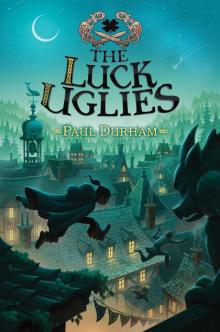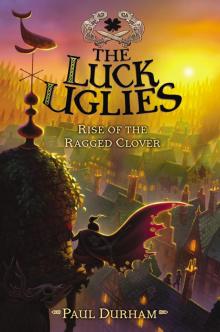- Home
- Paul Durham
The Fork-Tongue Charmers
The Fork-Tongue Charmers Read online
Dedication
For my three muses,
who inspire me even when I’m a grump
Contents
Dedication
Map
A Song about Bargains . . .
CHAPTER 1: Only Trouble Knocks after Dark
CHAPTER 2: The Mud Sleigh
CHAPTER 3: Grabstone
CHAPTER 4: Messages Undelivered
CHAPTER 5: The Sniggler
CHAPTER 6: A Village Drowning
CHAPTER 7: Scales and Swine
CHAPTER 8: Where Nobody Knows Your Name
CHAPTER 9: Thorn Quill’s
CHAPTER 10: Spidercreep
CHAPTER 11: Friends in Low Places
CHAPTER 12: In Shambles
CHAPTER 13: A Losing Hand
CHAPTER 14: The Slumgullion
CHAPTER 15: The Salt
CHAPTER 16: The Pull
CHAPTER 17: Belongers
CHAPTER 18: The Curse of Black Annis
CHAPTER 19: The Stone on the Sill
CHAPTER 20: The Wailing Cave
CHAPTER 21: Ties That Bind
CHAPTER 22: The Shoemaker
CHAPTER 23: Kiss of the Shellycoats
CHAPTER 24: The Uninvited
CHAPTER 25: What the Wind Brings, the Tide Takes Away
CHAPTER 26: Under the Crimson Hat
CHAPTER 27: Grit
CHAPTER 28: The Bellwether
CHAPTER 29: Treasures
CHAPTER 30: A Fork-Tongue Charmer
CHAPTER 31: Revenge of Slinister Varlet
CHAPTER 32: The Toll
Epilogue: Beyond the Shale
A Seafarer’s Guide to Mumbley-Speak and Other High Isle Chatter
About the Author
Credits
Copyright
About the Publisher
Map
A Song about Bargains . . .
Come all would-be heroes and join me in song,
And curse the dread outlaws plagued this Isle for so long.
So take heed my warning, of no favors ask,
Beware the dread outlaws in shadows and masks.
In shadows and masks, in shadows and masks,
Beware the dread outlaws
In shadows and masks.
Our troubles were many, our hopes they were slim.
A dark stranger arrived, he packed promise with him.
On the grayest of nights a bargain was struck,
What then seemed good fortune turned black ugly luck.
In shadows and masks, in shadows and masks,
Beware the dread strangers
In shadows and masks.
They’ll promise you freedom and all that you dream,
But look past their guise, they’re not what they seem.
Your sons and your daughters, in bed safely tuck,
Hold tight what you cherish for that they shall pluck.
In shadows and masks, in shadows and masks,
Beware the dread scoundrels
In shadows and masks.
My son he now stalks the dark b’yond the sea,
Family forgotten, but what matters to he?
So take heed my warning, of no favors ask,
And curse the Luck Uglies in shadows and masks.
In shadows and masks, in shadows and masks,
Curse the Luck Uglies
In shadows and masks.
—SHADOWS AND MASKS,
From “Songs of Salt and Stout
and Other High Isle Favorites”
1
Only Trouble Knocks after Dark
It wasn’t often that anyone thumped the cottage’s rusting iron door knocker after dark, but Rye O’Chanter still never expected to find three twisted, leering faces on the other side. They loomed down at her from behind flurrying snow. Rye knew what the masked figures were, if not who they were, so perhaps there was no need for alarm. Then again, Luck Uglies had never just shown up on her doorstep before. She took a careful step backward.
Abby O’Chanter joined her, a cloak flung over her nightdress. She’d already untied her hair ribbon for the night and her dark locks fell loose past her shoulders. In her arms she held the family pet, a regal beast with thick black fur and keen yellow eyes. He was as big as a young child, and as he stretched his long forelegs, he extended sickle-like claws for the benefit of the visitors. Shady could be a ferocious guardian when motivated, which wasn’t all that often. Abby combed his luxurious mane with her fingertips and raised an uninviting eyebrow. Rye’s mother had never been one to spook easily.
“What is it?” she demanded of the visitors.
The tallest of the three ducked his head under the fresh evergreen garland strung along the doorframe. Shady let out an unexpected rumble from deep inside his throat, the kind he generally reserved for unwelcome denizens of the bogs. Rye saw her mother slip her fingers around his runestone collar in case he decided to misbehave.
The masked figure hesitated, then opted to lean forward without stepping inside. The gnarled leather of a long, beakish nose jutted from under his cowl, so close to Abby’s ear it seemed it might jab her. Under Shady’s careful watch, the man whispered something that sounded like the rustle of dead leaves. He cocked his head as he spoke, and the mask’s hollow black eyes met Rye’s own.
The figure leaned back and snow once again settled onto his cloaked shoulders.
“He can’t come for her himself?” Abby said, an edge in her voice.
The figure shook his head.
“Come for who?” Rye asked.
Abby ignored her and seemed to bite back harsh words on the tip of her tongue. Instead, she said, “I’ve got porridge on the fire if you’d care for some.”
The masked figure just shook his head again.
“Be off then,” Abby said. She didn’t seem at all disappointed that they’d declined her invitation.
The figure nodded by way of good-bye and vanished into the shadows of Mud Puddle Lane with his two companions. Rye squinted to see where they went but spied only the flickering lantern lights of their neighbors’ cottages. She turned to her mother.
“What is it?” she asked.
“Your father,” Abby said. “He’s sent for you. You leave to meet him tomorrow.”
“But it’s finally Silvermas,” Rye protested. “And the Black Moon. How often does Silvermas fall on a Black Moon?”
Silvermas was Rye’s favorite tradition. Where once the holiday was intended to honor deities long forgotten, it had since evolved into a family celebration—a time for one last great feast before the chills and hardship of a long winter. Of course, in practice, Silvermas followed whatever night Good Harper actually happened to arrive in a particular village on his Mud Sleigh. This made for a great amount of speculation and excitement among the children. Rye’s mother and the other parents found the suspense to be of less amusement, particularly this year, since it was already early spring and Good Harper was only now making his way to Village Drowning.
The Black Moon—the darkest night of every month—well, that was something else entirely. Villagers locked their doors with the Black Moon’s rise, for the men who prowled the night under the moonless sky weren’t always so benign. Three of them had just left the O’Chanters’ doorstep.
“I don’t think your father’s timing is a coincidence,” Abby said. There was a weight on her face that Rye couldn’t quite gauge. “You’ll be away for only a day or so.”
“He’s been gone all winter,” Rye mumbled to herself. “Why now?”
It wasn’t that Rye didn’t want to see her father—she was just getting to know him when he’d abruptly departed to tend to some pressing matters outside the village. He had recently taught her a
ll sorts of useful skills her mother would never approve of—how to shimmy down a drainpipe while blindfolded, how to hide a key under your tongue and still sing an off-color limerick without slurring your words. He’d promised he would see her again as soon as he was able. But all winter she had been looking forward to meeting her friends and trading their Silvermas treats. Folly was usually willing to part with a few caramel pralines, and Rye always convinced Quinn to take the green licorice off her hands. Quinn actually seemed to like green licorice—he was odd like that.
“He wouldn’t have called if it wasn’t important,” Abby said stiffly, then softened. She gently pushed an unruly brown bang out of Rye’s eyes. Rye had never been one to fuss over her hair—it was too short to braid but too long to ignore.
“I know you’re disappointed, but he’s arranged a Silvermas surprise for you. Trust me, I think you’ll be pleased.”
Rye raised an eager eyebrow.
“You have to wait until tomorrow,” Abby said, anticipating her next question.
Abby flashed her a smile, but Rye noticed her mother’s hesitation before closing the purple door carved with the shape of a dragonfly. Abby stared down the northernmost end of Mud Puddle Lane, toward the dense pine forest known only as Beyond the Shale. Rye had seen that look before.
“Something in the air?” Rye asked, reaching out to scratch Shady’s furry ears. His bushy tail swayed in appreciation.
“Something,” was all Abby said, and they went inside for bed.
Morning’s first fingers of light had barely cracked the windowsill before Rye and her sister, Lottie, rushed from their room in their nightdresses. The cottage was already warm with the smell of Abby’s brown-sugar-and-raisin porridge, but the girls ran straight past their bowls, jostling for position at the cottage door. Lottie had strength beyond her years when there were sweets to be had, and Rye found herself knocked against the doorframe by the compact but determined three-year-old.
For centuries throughout the Shale, in towns large and villages small, residents would fill their shoes with coins and set them out on their doorsteps for Silvermas. Good Harper would then ride the Mud Sleigh through each village and collect the coins while the townspeople slept, to be distributed later to the needy and downtrodden. Good villagers received sweets in return. Bad villagers received a potato or, if they were really awful, mouse droppings. The more coins left, the better the fortunes of the family for the coming year. Woe betide the man, woman, or child who failed to leave at least one miserly bronze bit.
Rye crammed her hand deep into the toe of one oversize boot, then the other. The boots had belonged to Rye’s father when he was her age. They were ragged in the heels and probably contributed to her numerous stumbles, but Rye wore them every day. They came in particularly handy on Silvermas—more room for candies. And yet, that morning, they had done no good at all.
“Pigshanks,” Rye cursed.
Lottie had already emptied the bulging contents of her shoes and was busy stockpiling treats in her cheeks with the expertise of a chipmunk. She opened her chocolate-filled mouth.
“You said a bad word,” she garbled.
“Then you’d better not repeat it,” Rye said, holding an empty boot to her eye to get a better look. She couldn’t believe that Lottie, of all children, had gotten a full shoe while she had nothing. Not even a potato.
“Wait . . . ,” Rye said, finally discovering something deep inside the toe.
She removed a hard, heavy object and examined it in her hand.
“You got coal!” Lottie cackled.
“It’s not coal,” Rye said, rolling the stone over in her palm. It was the size and shape of a somewhat flattened egg, flawless ebony in color, and smoother than glass, as if polished by centuries of tides. It was also frigid. Instead of warming to her touch, it seemed to draw the heat from her fingers. She’d never seen a stone like it before.
“Rye got coal!” Lottie repeated when their mother appeared behind them. Abby pulled back Lottie’s thick red hair so it wouldn’t stick to the nougat on her cheeks. “And she said a bad word,” Lottie added quickly. She pretended to share a chocolate with Mona Monster, her pink hobgoblin rag doll.
“Maybe that’s why she got the coal,” Abby said, shooting Rye a look of disapproval.
“It’s a rock,” Rye said glumly. Embarrassed, she tucked it out of sight in her pocket. “Why would Good Harper leave me a rock?” This was shaping up to be the worst Silvermas ever.
“Mistakes happen sometimes, Riley,” Abby said. She shifted her leg so that the hem of her dress concealed her own overflowing shoe. It was too late; Rye had already seen it. “One year the Quartermasts’ hound got loose and ate all the Silvermas shoes,” Abby volunteered. “If that makes you feel any better.”
Rye just frowned. It didn’t.
“Speaking of which—” Abby began.
“Rye! Lottie!” a voice called. A boy in red long johns hopped on one foot from the cottage three doors down, one boot on and the other in his hands. He was tall and reedy, the sleeves of his undershirt ending well short of his wrists.
“Quinn Quartermast,” Abby said, “where in the Shale are your britches? You’ll get icicles in your lungs . . . or somewhere worse.”
Quinn shrugged and his cheeks turned as red as his long johns. He balanced on one foot and held out a boot full of treats.
“Do you want to trade?” he asked eagerly.
“Rye got coal,” Lottie said, examining Quinn’s haul with a discerning eye.
“I got a stone,” Rye clarified. That had a nicer ring to it than rock.
“Oh,” Quinn said in disappointment, but he quickly put on a happy face for Rye’s benefit. “You can have some of mine. I’ve got plenty of green licorice.”
“Thanks, Quinn,” Rye said halfheartedly. Lottie turned up her nose at the licorice and pulled her own pile closer.
Rye saw Quinn’s eyes suddenly go wide. He blinked hard, as if clearing blurry vision. He pointed to the far end of Mud Puddle Lane. “Is that—” he stammered, awestruck.
Rye and Lottie both turned to look. There, at the farthest end of the frozen dirt lane, was an enormous, weatherworn coach pulled by four heavily muscled draft horses. At their reins was a hefty, gray-bearded man in a wide-brimmed hat the color of a ripe plum. A matching woolly scarf enveloped his neck, its ends draped down to his boots.
Rye looked to her mother, mouth agape.
“You can’t say your father doesn’t have a flair for surprises,” Abby said. There was a tight smirk at the corner of her mouth that told Rye she remained both impressed and exasperated by her father’s special brand of flair. “You, my love, are going for a ride on the Mud Sleigh. Now let’s get you loaded up before Good Harper finds himself overrun by every child in Drowning.”
2
The Mud Sleigh
Never in all of Good Harper Killpenny’s many years had the Mud Sleigh been robbed, accosted, or otherwise bothered by bandits or highwaymen. In fact, he rode under the protection of the most fearsome outlaws of all. Thanks to a bargain struck between the Luck Uglies and generations of Good Harpers before him, Killpenny traveled safely without guards, comfortable in the knowledge that a harsh and swift reckoning would befall any opportunist foolish enough to trouble him on his journey.
That was what he told Rye, anyway, as they left Drowning under a clear morning sky. She suspected that this was precisely the reason her father had arranged for her passage on the Mud Sleigh, and the only reason her mother had allowed it. Rye looked back, waved to Abby, Lottie, and Quinn, and examined the contents of the coach. Its hold was loaded up with more gold and silver than a flush noble’s treasure hole.
The River Drowning was still frozen over in long stretches, light snow cover transforming it into a wide, smooth roadway. Rye twitched with the excitement of a new adventure as the village’s twisted rooftops disappeared behind them, the horses pulling the sleigh along the ice so swiftly that the wind rustled her hair. Soon she was
shifting in her seat to get a better view of the Western Woods as they traveled southwest, farther from home than she had ever been before. Eventually, however, all the trees began to look the same. She asked Good Harper four times if they were almost there, until he said something about having a bad ear and stopped responding altogether. She sang a song to pass the time. Rye’s voice must have miraculously cured Good Harper’s hearing, because he begged her to stop it right away. She sighed and thrust her chin into her hands. It was only midday.
Dusk came early, and by nightfall Rye’s boredom had been replaced by a dull anxiety as she huddled under a heavy blanket on top of the driver’s box. They had stopped to make camp on the frozen river itself, at a particular bend where Good Harper said they were to wait for Rye’s father to come collect her. Rye tried to take comfort in the Mud Sleigh’s unblemished history as she listened to howls in the distance. The horses kicked at the ice and shuffled nervously around their camp. These animals must have seen and heard it all in these woods over the years, but tonight something had them spooked.
From his seat next to Rye, Good Harper scratched his beard and popped a cinnamon candy into his mouth. He offered one to Rye, but she just shook her head. It would have been a whole lot nicer if he’d left some for her last night. Good Harper offered her a potato. She turned that down too.
“You’ve gone quiet,” he remarked, which wasn’t entirely true. The fact was, Rye could hardly sneak a word in between his own ramblings. After his long months alone on the Mud Sleigh, Good Harper was well-practiced in talking to himself.
“It’s a shame,” he said with a snort. “Good conversation, or even polite small talk, has become harder and harder to come by.”
“I’m sorry, I don’t mean to be—”
“The Shale folk have grown stingy,” Good Harper continued, as if he hadn’t heard her at all. “Nowadays they fill their shoes out of nothing more than habit. There seems to be no genuine concern for the needy, not even a healthy fear of bad luck. Drowning is the worst of the lot. It’s a glorified mud hole with its creeping bogs and notorious forest. Most of its residents barely muster up more than a few token bronze bits, and those who do put out shoes that smell like last month’s cheese.” He cast her a quick glance. “No offense, by the way.”

 The Fork-Tongue Charmers
The Fork-Tongue Charmers The Last Gargoyle
The Last Gargoyle The Luck Uglies
The Luck Uglies Rise of the Ragged Clover
Rise of the Ragged Clover